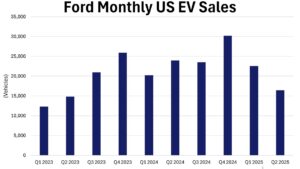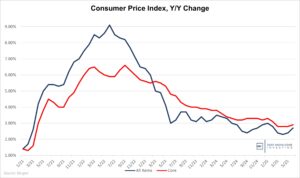At the beginning of the week, we heard the hyperbolic prediction that the Nvidia ($NVDA) earnings report was the most important of all time. That’s ridiculous, and given the reaction of stock markets worldwide, may actually be true. The Fed disappoints investors again and despite Powell saying “higher for longer” for almost two years, somehow surprises people. Dr. David Glancy has insightful comments on green energy and red energy, and DKI will be posting video excerpts all week. The full video is here. Walmart ($WMT) reports earnings and an acquisition that changes the streaming device market. And the Japanese stock market index finally makes a new all-time high after more than three decades. We’re skeptical of the current value of the Nikkei. Confusing? Don’t worry: We explain in this version of the 5 Things.
This week, we’ll address the following topics:
- Nvidia ($NVDA) bulls insist that this week’s earnings report is the most important of all-time. The company beat expectations and set off a worldwide stock rally. The bulls have a point.
- The Federal Reserve releases the minutes from the last meeting. The conclusion: “Higher for longer”.
- Dr. David Glancy of the IWP points out that green energy is really red energy. Environmentalists won’t want to read this one.
- Walmart ($WMT) acquisition of Vizio is bad for Roku ($ROKU).
- The Nikkei finally surpasses its 1989 high. Are the gains real? We’re not convinced.
Ready for a new week of single stock indexes? Let’s dive in:
1) Nvidia Delivers the Most Important Earnings Report of All-Time
$NVDA is the rare company delivering incredible fundamental performance in the hottest growth area of the market and a chart that looks like a meme stock. Nvidia makes the best graphics chips used for artificial intelligence (AI) applications. The stock is up 10x in approximately five quarters. It’s the third largest company in the world by market valuation, and its large size combined with huge stock gains means it’s the largest driver of S&P 500 performance. This has caused portfolio managers desperate to avoid underperforming their benchmark indexes to buy more of the stock, and its earnings report drove a worldwide stock rally. In fairness, the revenue growth here is extraordinary.

The revenue growth will continue into this year as well.
DKI Takeaway: Nvidia’s incredible performance is masking an inconsistent stock market. While the indexes are at all-time highs, most companies aren’t participating in the rally. Because the S&P 500 is capitalization weighted, the performance of a few mega-cap tech firms has created one of the narrowest stock rallies in history. However, some bears are comparing $NVDA with Cisco ($CSCO) during the internet boom of the late ‘90s. While both companies are selling the “picks and shovels” for a growing market, I don’t think it’s the right comparison.
Cisco was selling servers to money-losing firms with no business plan. Nvidia is selling to massive high-growth tech firms with huge amounts of free cash flow. Would you rather sell to Google or to Pets.com? More detail on this in this week’s Complete Intelligence program.
2) The Federal Reserve Again Surprises Everyone by Being Consistent
The Federal Reserve released the minutes from its last meeting and again shocked people by doing exactly what they’ve been saying they’d do for the past two years. The minutes made clear that the Fed isn’t about to “pivot” to lower interest rates. Instead, they’re looking for more evidence that inflation is under control and continuing to recede before reducing rates.

Credit to TotherCanvas249 for the clever meme.
DKI Takeaway: Market participants have been expecting the Fed to lower rates since June of ’22. DKI has spent the last two years telling you it wasn’t going to happen yet. We think people are missing the quiet fight between the Federal Reserve which is trying to get inflation under control, and Congress and the Treasury which is spending and monetizing at a highly inflationary pace. Congress has decided to fund the government through debt, money printing, and inflation which allows them to blame everyone but themselves for higher prices. We think this is unwise and prevents a real discussion on the proper size and scope of government. When everything appears “free”, there’s an incentive to fund everything. The Fed has disappointed many, but they’re not wrong right now.
3) Is Green Energy Really Red Energy?
DKI did a webinar this week with Dr. David Glancy of the Institute of World Politics on geopolitics and economics. One of Dr. Glancy’s most insightful points was on the dominance of China in “renewable energy”. Most of the components made for solar panels, windmills, and electric vehicle batteries are made in China meaning “green energy” is really “red energy”.

This is your real green energy option for baseload generation.
DKI Takeaway: China is building large amounts of coal-fueled electric generation. In addition, the mining of green energy components has a huge negative environmental toll. This means that we’re committing an increasing amount of our future energy security to a country that would have no problem cutting off the supply of components during a future conflict. In addition, rather than reduce pollution, in many cases, we are simply exporting it to a country with a less clean grid and weaker environmental regulations. If you want clean baseload generation without carbon emissions, then nuclear is your best option.
4) Lockdown Darling Stock Roku Gets Slammed by Walmart Acquisition
Roku ($ROKU) makes devices that turn any television into a “smart” device capable of streaming any of your favorite channels or services. It was one of the lockdown darling stocks that benefitted from much of the country staying at home and binge-watching everything Netflix and other streaming services had to offer. The stock rose from a little over $50 to almost $500. As someone who cut the cable-cord more than a decade ago, I was an early adopter of streaming devices, and while Roku makes excellent hardware, it was hard to see how they were differentiated from comparable devices make by Apple ($AAPL) and Amazon ($AMZN). Making things more challenging: Almost all new televisions have streaming capacity right out of the box.

Unlimited TV-watching at home was never going to be a full-time option.
DKI Takeaway: In the past week, the stock has gone from $80 to $64. Part of that was weak guidance. The rest was related to Walmart’s ($WMT) acquisition of inexpensive TV-maker, Vizio. The problem for Roku is it provides the streaming functionality and operating system for Onn, Walmart’s private label television brand. Vizio has its own operating system called Smartcast. While nothing definitive has been announced yet, it’s reasonable to assume that Walmart will start to use Smartcast in its Onn devices and drop Roku. Roku’s product is excellent, but a lack of any differentiation in a business that was quickly becoming a commodity was why DKI avoided the stock.
5) After Decades, the Nikkei Hits a New Record – Sort of
The Nikkei is the Japanese stock index. It hit its all-time high in 1989 and stayed below that level for 35 years. That changed this week as the index finally hit a new all-time high. Before we celebrate, we’re a bit skeptical of how the Japanese achieved this particular “success” story.

This is one of the longest drawdowns for a major economy and stock market ever.

This success story relied on a devalued currency.
DKI Takeaway: The Japanese government has taken on a lot of debt and has devalued its currency. The long-term graph shows the value of the Nikkei in yen. However, much of the incredible rise in the index over the past few years has been fueled by a drop in the yen from just over 100 to the dollar to more than 150 to the dollar. That means that despite big gains, the Nikkei is actually down in dollars over the past few years. Many people who were bullish on Japanese equities for the last couple of years forgot they were taking on a huge amount of currency risk. Stated more simply, 40,000 yen doesn’t buy as much in 2024 as it did in 1989.
Information contained in this report, and in each of its reports, is believed by Deep Knowledge Investing (“DKI”) to be accurate and/or derived from sources which it believes to be reliable; however, such information is presented without warranty of any kind, whether express or implied. DKI makes no representation as to the completeness, timeliness, accuracy or soundness of the information and opinions contained therein or regarding any results that may be obtained from their use. The information and opinions contained in this report and in
each of our reports and all other DKI Services shall not obligate DKI to provide updated or similar information in the future, except to the extent it is required by law to do so.
The information we provide in this and in each of our reports, is publicly available. This report and each of our reports are neither an offer nor a solicitation to buy or sell securities. All expressions of opinion in this and in each of our reports are precisely that. Our opinions are subject to change, which DKI may not convey. DKI, affiliates of DKI or its principal or others associated with DKI may have, taken or sold, or may in the future take or sell positions in securities of companies about which we write, without disclosing any such transactions.
None of the information we provide or the opinions we express, including those in this report, or in any of our reports, are advice of any kind, including, without limitation, advice that investment in a company’s securities is prudent or suitable for any investor. In making any investment decision, each investor should consult with and rely on his or its own investigation, due diligence and the recommendations of investment professionals whom the investor has engaged for that purpose.
In no event shall DKI be liable, based on this or any of its reports, or on any information or opinions DKI expresses or provides for any losses or damages of any kind or nature including, without limitation, costs, liabilities, trading losses, expenses (including, without limitation, attorneys’ fees), direct, indirect, punitive, incidental, special or consequential damages.




